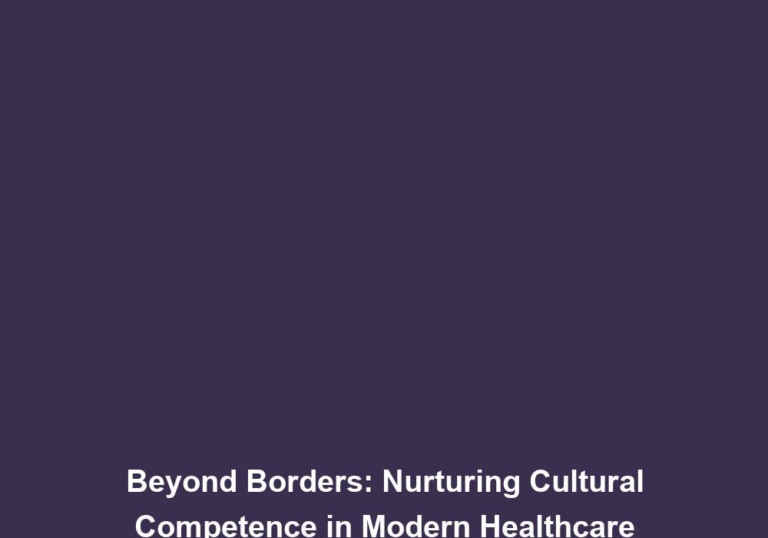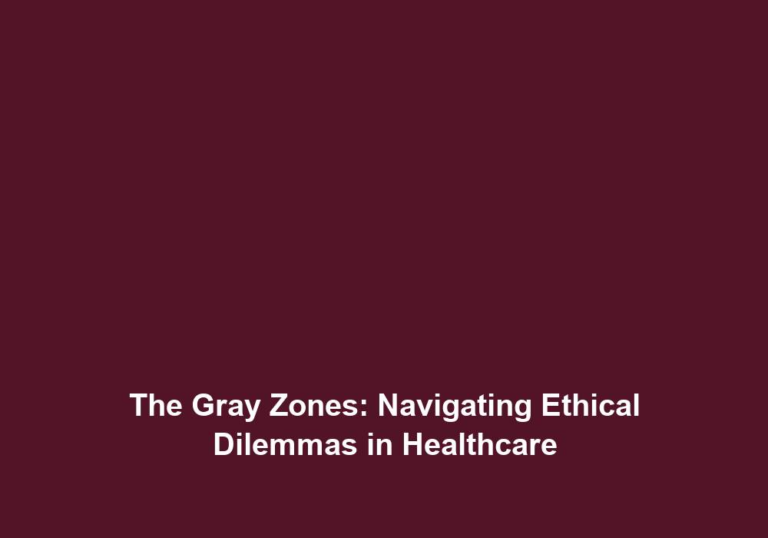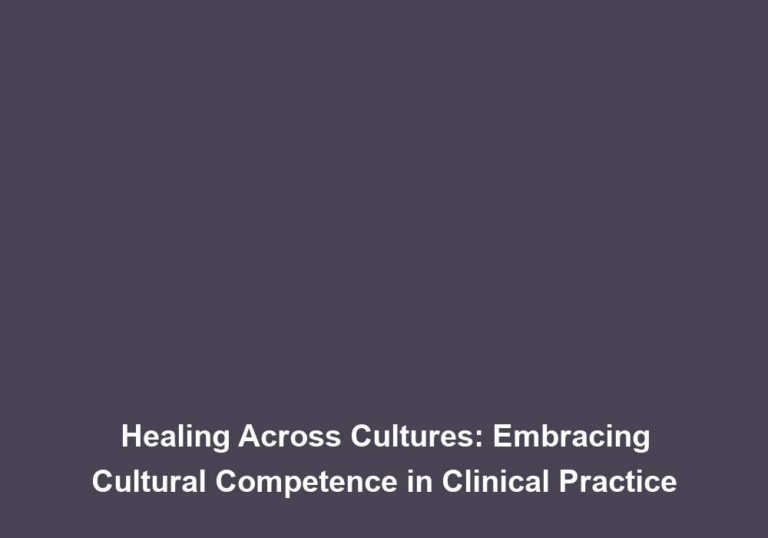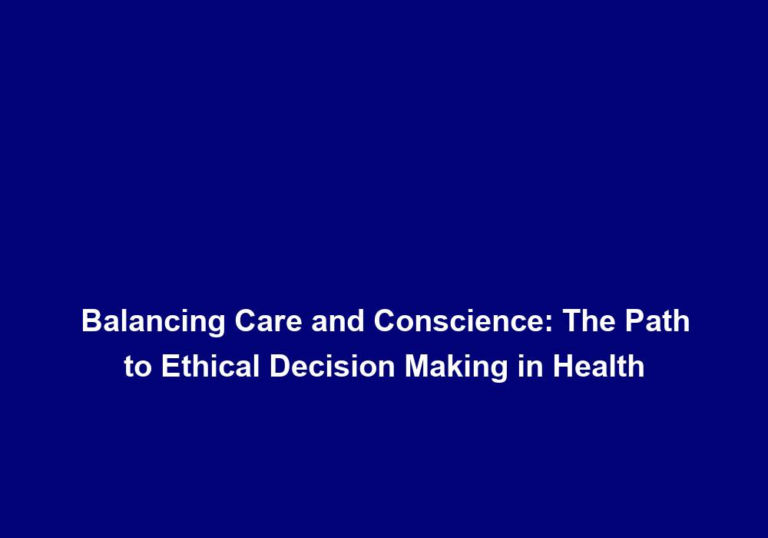Principles at the Forefront: Ethical Decision Making in Healthcare
Ethical decision making in healthcare is a critical aspect that healthcare professionals must navigate on a daily basis. It involves evaluating different courses of action and making choices that are morally right, just, and respectful of patient autonomy. By adhering to the principles of medical ethics, healthcare providers can ensure the well-being and dignity of their patients. In this article, we will explore the fundamental principles that guide ethical decision making in healthcare and their importance in providing quality patient care.
1. Respect for Autonomy
Respect for autonomy is a fundamental principle in healthcare ethics. It recognizes that patients have the right to make decisions about their own health and medical treatments. Healthcare professionals should provide patients with all the necessary information and support to make informed decisions.
Respecting autonomy involves actively involving patients in their care and treatment planning. This means engaging in open and honest conversations about the options available, discussing potential risks and benefits, and addressing any concerns or questions the patient may have. By empowering patients to make autonomous decisions, healthcare professionals can promote patient-centered care and foster a sense of trust and partnership.
In addition to providing information, healthcare professionals must also obtain informed consent from patients before proceeding with any medical intervention or treatment. This ensures that patients fully understand the nature of the intervention, its potential consequences, and any alternative options. Obtaining informed consent is not only an ethical obligation but also a legal requirement in most healthcare settings.
To enhance the respect for autonomy, healthcare professionals can utilize tools such as decision aids and shared decision-making models. These tools facilitate the exchange of information, help patients understand their options, and support them in making decisions that align with their values, preferences, and goals.
2. Beneficence
The principle of beneficence emphasizes the obligation of healthcare professionals to act in the best interest of their patients. This includes providing appropriate care, promoting well-being, and preventing harm.
Healthcare providers need to carefully assess the potential benefits and risks of different treatment options to determine the course of action that maximizes the overall benefit for the patient. This requires considering the patient’s individual circumstances, values, and goals.
To ensure beneficence, healthcare professionals must stay updated with the latest evidence-based practices and guidelines. By continuously expanding their knowledge and skills, they can provide the most effective and beneficial care to their patients.
Promoting well-being also involves addressing the social determinants of health and advocating for policies and practices that promote health equity. Healthcare professionals can work collaboratively with other stakeholders to address systemic barriers and improve access to quality healthcare for all individuals, regardless of their background or social status.
3. Non-Maleficence
Non-maleficence is closely related to beneficence and requires healthcare professionals to do no harm to their patients. This principle emphasizes the importance of minimizing the risks and potential harm associated with medical interventions.
Healthcare providers must carefully assess the potential risks and benefits of a treatment, considering the individual circumstances of each patient, to ensure that the chosen course of action does not cause unnecessary harm. This requires engaging in critical thinking and weighing the potential benefits against the possible adverse effects.
In addition to avoiding harm, healthcare professionals should also actively prevent harm by implementing appropriate safety measures, following infection control protocols, and monitoring patients for any signs of adverse reactions or complications. By prioritizing patient safety, healthcare providers can minimize the occurrence of medical errors and adverse events.
It is essential for healthcare professionals to maintain a high level of competence and proficiency in their practice to ensure that they can deliver safe and effective care. This includes participating in continuing education, staying updated with advancements in medical knowledge, and adhering to evidence-based guidelines and best practices.
4. Justice
The principle of justice involves the fair allocation of resources and the equitable distribution of healthcare services. It requires healthcare professionals to treat all patients with fairness, impartiality, and without discrimination.
Healthcare providers should ensure that their decisions are guided by fair and transparent processes, taking into account the needs, preferences, and priorities of each patient. This requires being aware of and addressing any biases or prejudices that may influence decision making.
To promote justice, healthcare professionals can advocate for healthcare policies that aim to reduce health disparities and improve access to care for marginalized populations. They can also actively engage in community outreach programs to provide healthcare services to underserved communities.
By promoting justice in healthcare, healthcare professionals contribute to a more equitable society where everyone has an equal opportunity to receive the care they need and deserve.
5. Veracity
Veracity, or truthfulness, is an essential ethical principle in healthcare. It emphasizes the importance of honesty and transparency in all patient-provider interactions. Healthcare professionals should provide accurate and relevant information to patients, ensuring that they have a clear understanding of their medical condition, treatment options, and potential outcomes.
Open and honest communication is crucial in building trust and maintaining a strong patient-provider relationship. Healthcare professionals should avoid withholding information or providing misleading or false information. They should also be transparent about any limitations or uncertainties in the available information.
To enhance veracity, healthcare professionals can improve their communication skills, including active listening, empathy, and clarity in conveying complex medical information. They can also utilize visual aids, written materials, or digital resources to facilitate patient understanding and engagement.
6. Confidentiality
Confidentiality is a cornerstone of medical ethics, ensuring that patients’ personal and medical information remains private and protected. Healthcare professionals have a duty to maintain patient confidentiality and respect their right to privacy.
This principle requires healthcare providers to handle patient information securely and only share it with authorized individuals involved in the patient’s care. Confidentiality extends to all forms of communication, including electronic health records, verbal conversations, and written documentation.
To uphold confidentiality, healthcare professionals should adhere to legal and ethical guidelines, such as obtaining patient consent before disclosing any information and using secure methods for storing and transmitting sensitive data. They should also regularly undergo training and education on privacy and data protection laws to stay informed about best practices.
Respecting confidentiality not only preserves patient trust but also ensures compliance with legal and regulatory requirements, such as the Health Insurance Portability and Accountability Act (HIPAA) in the United States.
7. Integrity
Integrity is a vital principle in ethical decision making, emphasizing honesty, accountability, and adherence to professional standards. Healthcare professionals must conduct themselves with integrity, ensuring that their actions align with their ethical obligations.
This principle encompasses the responsibility to acknowledge and address any conflicts of interest that may arise, placing the best interests of patients above personal or financial gain. Healthcare professionals should strive to maintain transparency in their relationships with patients, colleagues, and other stakeholders.
Integrity also involves taking responsibility for one’s actions and acknowledging mistakes or errors. Healthcare professionals should be open to feedback and actively engage in continuous quality improvement efforts to enhance the delivery of care.
By demonstrating integrity, healthcare professionals contribute to the overall trustworthiness and credibility of the healthcare system. Patients and the public rely on healthcare professionals to act ethically and uphold the highest standards of professional conduct.
Conclusion
Ethical decision making in healthcare is guided by a set of fundamental principles that prioritize patient autonomy, well-being, fairness, honesty, and privacy. By upholding these principles, healthcare professionals can navigate complex ethical dilemmas and provide quality care to their patients. It is imperative for healthcare providers to continually refine their understanding of ethics and remain committed to ethical decision making as they strive to improve patient outcomes and uphold the integrity of the healthcare profession.






